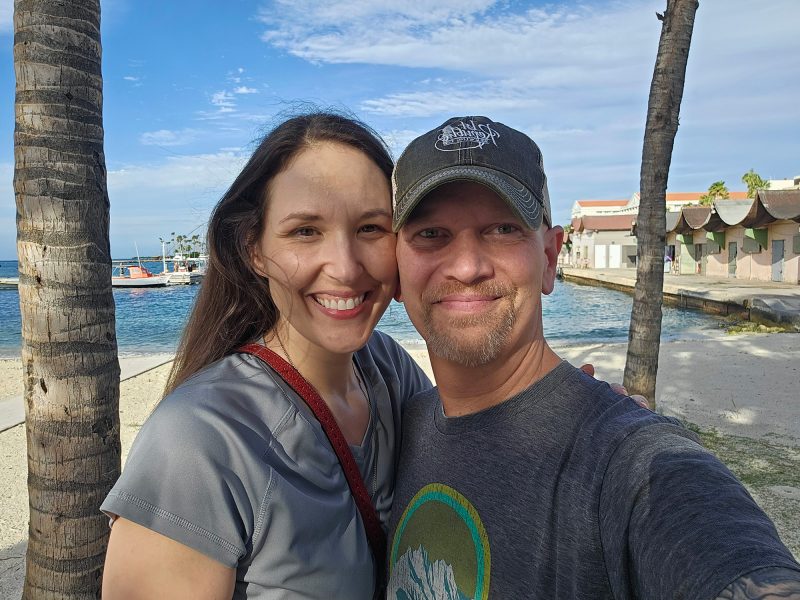Chris’ Story: From Military Service to Cancer Fighter and Survivor

My name is Chris. I’m a throat cancer survivor, and this is my story.
My cancer journey began in the summer of 2023 when I was 48 years old. To give you some background, I served 20 years in the United States Army and retired in 2013. Following that, I was a contractor in Afghanistan, helping train their troops in Counter Improvised Explosive Device (IED) defeat.
Upon my return to the States, I obtained my bachelor’s and master’s degrees and spent several years at the University of North Georgia (UNG) in Dahlonega, working with their Corps of Cadets. Now, I’m living the dream and working with fellow Rangers at Camp Frank D. Merrill in Dahlonega as their military mountaineering training specialist.
All this to say, I’ve been lucky enough to train with some of the toughest people in the world. Some of my military experiences were difficult. And yet, nothing I’ve experienced measured up to some of what I endured during my cancer journey.
However, my past training very likely helped me keep a positive outlook and “let’s do this” attitude throughout my treatment. That was one of the most important factors for my success.
Staying positive is not easy, but it is possible and necessary.
A Lump Under My Jaw? That’s Weird!
On July 18, 2023, I noticed a small lump under the right side of my jaw. I wasn’t concerned. I just thought it was weird, so I mentioned it to my wife Jennifer. We decided then that it would be best to have it checked.
That next week I saw my primary care physician who identified it as an enlarged lymph node and ran a variety of blood tests — all of which came back within normal ranges. With no worries, my doctor sent me to a surgeon with a plan for removing it.
We were not very concerned at this stage because of the test results and thought everything would be easily handled with surgery. Thankfully, at the consultation appointment, my surgeon decided to perform a needle biopsy as a precaution.
That Labor Day, the surgeon called with the biopsy results, informing me that I had cancer. At first, I was speechless. Hearing that you have cancer is a huge shock and takes some time to process.
My wife and I did what I imagine most people do; we looked to Google to find answers. My advice to anyone who may be on a similar path is to STAY OFF THE INTERNET. It scared us senselessly, and most of what we found did not apply to our situation, but we didn’t know that then.
If you are reading this and going through what is already a frightening ordeal, please do yourself a favor and let your healthcare professionals tell you about your specific cancer and treatment options.
It will save you from losing sleep needlessly. Once you have more information, you can then do your own research so that you can make informed decisions and come prepared with questions.
I Have Throat Cancer? What Now?
The next steps were taken very quickly by my doctor and surgeon. They referred me to an ENT (ears, nose and throat specialist) and medical oncologist who specializes in various tumor types and cancer treatments like chemotherapy.
This is when my wife and I met Dr. Sreekanth Reddy from the community oncology practice Cancer and Blood Specialists of Georgia, who was recommended to us by my doctor and have truly made all the difference in this journey.
It was after a PET/CT scan that I learned more about my cancer. I learned that several lymph nodes, on both sides of my neck, were affected and that I had stage II throat cancer, which is a category of head and neck cancer. Fortunately, my prognosis was very good since we caught it so early.
I was diagnosed with squamous cell carcinoma (SCC) of the oropharynx (or tonsil).
Because of my diagnosis, I was not a candidate for surgery. Instead, I would need seven weeks of treatment with chemotherapy once per week and radiation five times a week.
This is when the difficult conversations started.
The doctors explained how my body would likely react to chemotherapy and radiation. Beyond struggling with nausea, I was advised to expect throat pain, swelling, burning and extreme difficulty swallowing.
You see, the chemotherapy drugs alone can make you feel unwell with unpleasant side effects, and over time, the radiation can make it hard to even swallow water much less food.
They expressed the importance of remaining nourished and advised me to consider a feeding tube placement before beginning treatment.
For me, hearing that I may need a feeding tube was a bigger shock than hearing I had cancer. After talking to a couple of people who had been through similar treatments, I learned that a feeding tube may very well be necessary. I elected to have it placed before starting treatment.
This was a very good decision because getting a feeding tube is beyond painful and adjusting to it takes some time. I could not imagine going through that process while also receiving treatment.
They also recommended that I get a port to make chemotherapy treatment easier on my body. That was another great decision.
Throat Cancer Treatment Truths
The first two weeks of treatment were not that bad. My doctors warned me that symptoms may get progressively worse as time progresses and to expect it to become very difficult between weeks three and four.
Unfortunately for me, I had a couple of bad days between weeks two and three. I remember that on a Saturday, my throat started to hurt to the point that I could not swallow, and the nausea was so extreme that any movement made me incredibly sick. Even the thought of food was repelling.
Using the feeding tube also made me very nauseous. I wasn’t getting enough nourishment or fluids that weekend and, by Monday, I was in bad shape.
The Ugly Truth About Needing Medication During Throat Cancer Treatment
This was my first lesson on how quickly things decline without nourishment. Thankfully, my chemotherapy treatment was on Monday, and the doctors and their team took quick action, providing me with fluids, anti-nausea meds and a medication schedule to manage the pain and stomach upset.
At the time, I was devastated to have to postpone that week’s chemotherapy, but now I see that it made no difference whatsoever in my overall treatment. Just two days later I felt much better and received that week’s chemotherapy dose.
Following the new medication schedule put me back on track. I was able to begin eating and drinking through my mouth again. I’m someone who prefers not to take medication. When presented with a health concern, I default to non-chemical means for correction.
However, that simply was not possible for me during this treatment plan. If you are someone who also doesn’t like to take medications, please give it some consideration as a special circumstance during your cancer journey.
It may make all the difference. It kept me out of the hospital more than once.
Hard Days During Throat Cancer Treatment
I did well for the next couple of weeks. There were good days and some not-so-good days.
The last week of throat cancer treatment was incredibly difficult. For me, things improved slightly when I began consuming blended food through my feeding tube rather than the formulas I had been trying.
I tolerated blended food much better than any of the bottled or boxed formulas that always made me so nauseous. My wife even found recipes for blended tube feeding online. She used a heavy-duty blender to make the mixture smooth enough for tube feeding.
Once we began using those recipes, the weight loss leveled off, which was a relief. At one point, I lost between eight and 10 pounds in one week. During the last seven to 10 days of treatment, I was mostly dependent on tube feeding.
While the last couple of weeks of chemotherapy and radiation were difficult, they were nothing compared to the pain and suffering during the two weeks following the end of my treatment. I have never felt so much pain or been so sick in my life.
Having help during this time made all the difference. There were days when I could barely get out of bed or feed myself through the tube.
Please ensure that your support system remains in place even after treatment ends. You will need it.
Improvements After Cancer Treatment Ends
After those first couple of weeks following treatment, I slowly began to recover. Be patient because this is a gradual process.
The more time that went by, the more energy I had. I kept trying to eat and drink so that I would know when it would be possible again.
I tried every day, even when it was painful or made me nauseous. I didn’t force it but was consistent with the effort.
Several months later, following my cancer-free diagnosis, I had my feeding tube and port removed.
That was the best day in a long time! I immediately felt better — like myself again. Things started to get better after that.
Almost One Year After My Cancer Journey Began
Now, about a year after my journey began, I’m doing and feeling great. I still weigh 150 pounds whereas I began this journey at 192 pounds and am focused on weight training and endurance building.
Recovering takes time and patience. I often must remember to be kind to myself and stay focused on the positives.
My Parting Advice to Others
Here are four pieces of advice I would like to share with others who are facing a cancer diagnosis:
- Don’t rely on the internet for medical advice or information.
- Find a lump? Do not wait to get it checked out.
- Take your antinausea and pain meds. They make a huge difference.
- Lastly, never quit!
This is a personal account from a cancer patient who receives care from Cancer and Blood Specialists of Georgia.
